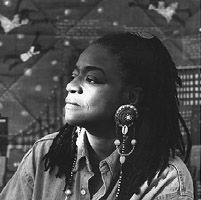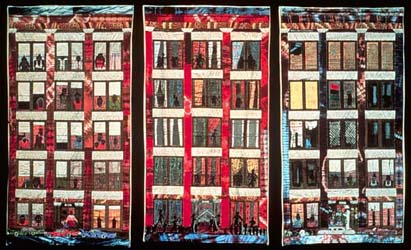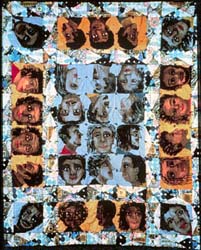
Black and white portrait of Faith Ringgold as seen on faithringgold.com
An Interview with Faith Ringgold:
January 25, 2006, Nancy Egol Nikkal
Question: What inspired you to start the Anyone Can Fly Foundation? What is most meaningful about it? Who does it serve?
Ringgold: African-American artists suffer the same problems as all artists – they are not represented in the mainstream of American culture because art is not at the center of society. Art is not a popular thing. Most people are not involved in the arts and do not know much about art or the works of artists. African-American artists are likely to get lost.
The Anyone Can Fly Foundation aims to keep alive the reputations of the great African American artists so we continue to know who they are.
The Foundation offers grants to scholars to write about African-American artists, and offers grants to teachers to go into the schools to teach children about African-American artists.
We all know that kids love art – it’s easy to teach them about art and artists – but they never get the opportunity to learn about black artists. With the Anyone Can Fly Foundation grants, now they can.

Street Story Quilt #1, #2, #3 (triptych) 1985 Acrylic on canvas, dyed, painted & pieced fabric 90×144 inches collection: Metropolitan Museum of Art, NY, NY
The website for the Anyone Can Fly Foundation states: The mission of the Anyone Can Fly Foundation is to expand the art establishment’s canon to include artists of the African Diaspora and to introduce the Great Masters of African-American Art and their art traditions to kids as well as adult audiences. The Foundation is a 501©(3) charitable organization supported by people devoted to the visual arts.
To accomplish its mission, the Foundation has initiated two programs: (1) The Distinguished Artists & Scholars Lifetime Achievement Award to honor master artists and scholars, and (2) the African-American Timeline of Art History, which, under the direction of Trish Maunder, Project Director, developed teacher’s presentation kits and arts workshop materials (with lesson plans) on the great African-American artists of the 20th century: Romare Bearden, Elizabeth Catlett, Aaron Douglas and Jacob Lawrence.
The Foundation offers two grants: the Professional Scholars Grant and the Art with Kids for Elementary Schools Grant. The application deadline for 2006 is February 28, 2006. Grantees are selected without regard to race, creed or color. See more information at the Foundation web site: http://www.artsnet.org/anyonecanfly.
Question: In what way is jazz a recurring theme for you?
Ringgold: I was brought up with all different kinds of music. Jazz has always been important to me. I think that slaves brought the music with them – I realize now that that music was a way of talking, and music continues to be the center of society. Its origin is African-American, but now it is so powerful it is American music. I ask: How can you be a slave, and exploited, and give the gift of music? Music insured that we stayed free. It couldn’t be denied. Music is a life force. I try to interpret the music in my work. You can’t see the music, but you can feel it. I try to make it visible through my work.
Question: If there were one thing you would say about art, the importance of art, what would it be?

Echoes of Harlem, 1980 Acrylic on canvas, dyed, painted & pieced fabric 96×84 inches collection: Philip Morris Companies, Inc.
Ringgold: Art allows individuals to have a voice. It’s a way of speaking and communicating. Everyone has a need to make a mark and make something visible. It’s an absolute necessity. Children start off making art. They come into the world as artists and continue to be artistic until about age10. Then the art making stops because they realize they are revealing themselves – exposing themselves in a personal way. Art-making makes them unique. They may not want to be unique; they may want to be like everyone else. This is part of growing up and fitting into the world. Some of us continue to be artists, to hold onto art-making. Art is very, very important.
Question: What would you like people to remember about you? About your art? About your life’s work?
Ringgold: Whenever I hear that question, I always think of Dr. Martin Luther King – he said he wanted to love somebody. He had great love for people. I think that was one of the things that made him great.
As an artist, I am trying to communicate with people, not necessarily trying to please them. I would like my work to live on as most artists do.
Question: Why is it important for artists to work in series? Are you currently working on a series?
Ringgold: Yes, I always work in series. As an artist I was influenced by Jacob Lawrence. He was a master of composition, and was able to translate his ideas so beautifully into images and color. He could make so many variations on a theme. There was no way he could make just one image of his ideas – it had to be several images. There’s more, and there’s more.
I like to work in series. Usually when you start to say something,
It’s going to take many pictures. When you work in a series, you can relax and spread it out. I’m still working on my JAZZ Series and COMING TO JONES ROAD Series. Both have to do with freedom
IN CONCLUSION:
For those who were lucky enough to hear Faith Ringgold speak at the student reception December 1, 2005 at the Morris Museum in Morristown, NJ, you know she spoke at length about the importance of art for young people, and also about the influence the African-American artist Jacob Lawrence had on her life and her work.
Ringgold said she hopes that artists like Jacob Lawrence (and others like Elizabeth Catlett, Aaron Douglas, and Romare Bearden), who have struggled their whole life to fulfill their love of art and beauty and freedom live on – and one way is through her Anyone Can Fly Foundation.
Regarding her legacy as an artist: Ringgold said she would like to continue to work until she can’t work anymore. She references Romare Bearden, who worked until his death in 1988 at the age 74, and she mentioned Elizabeth Catlett, who is still alive, and working in her 90s.
Ringgold says: I want to inspire people like they inspire me.
Please go to her website at http:/www.faithringgold.com and you will be inspired.